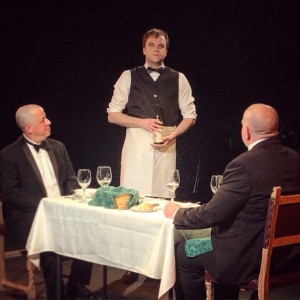 “Is it any less true than if it were true?” – Louis, Le Dernier Repas: A Love Story
“Is it any less true than if it were true?” – Louis, Le Dernier Repas: A Love Story
Counter-Productions Theatre Company starts its New Works series with a remarkable world premiere of a piece by David Eliet, a prodigious playwright whose works have been seen on Rhode Island stages for many years. Eliet has never shied away from the darker corners of humanity, but there is always a strain of hope, of redemption in his work. Le Dernier Repas: A Love Story continues his streak, giving CPTC a powerful production with a play that unravels slowly, beautifully, and eventually grips the heart without letting go.
Eliet tells Motif, “The play was the last of a half dozen plays I wrote over a 10-year period about The Holocaust. I was inspired to do so, when, by an amazing set of circumstances, I met an amazing woman who had been a rescuer during The Holocaust.” The notion of the human spirit striving under the most difficult circumstances imaginable in Nazi-occupied Europe is certainly well-trodden territory, and comparisons to Roberto Benigni’ s Life is Beautiful (and even My Dinner With Andre) are not unwarranted, but Le Dernier Repas stands on its own in no small way. Two close friends, Louis (CPTC Artistic Director, Ted Clement) and Robert (Geoff Leatham) share the perfect meal, in elegant surroundings, discussing food, sex, love and the failings of every nationality except the French. All of these topics are intertwined and cross-related in this tight script, at times mirroring the rapidfire dialogue of Mamet but also taking time to breathe and wallow in the slow, bittersweet unravelling of two lives. Rufus Qristopher Teixeira’s direction is tactful, allowing for the dynamics of the script to play out naturally without forcing his actors to make choices that don’t serve the play. Indeed, for most of the show, the action is limited to Louis and Robert seated, waxing philosophical about food and love while a stoic waiter, Franz (Derek Smith), delivers each course with Michelin-rated precision.
As the conversation and the dinner unfold, we learn more and more about each man beyond their shared love of fine cuisine and their experience as chefs. Small hints drop, over time, about set and setting. Each man is tuxedoed, yet bald. Based on the dates of the wine they drink and some quick math, we realize that we are in 1944 France. We see the hints of a struggle as both Robert and Louis bemoan the loss of their wives, whether by death or other means. There is a beguiling demarcation between dark surrealism and drawing room comedy at times, but as the other shoe begins to drop, the weight is almost too much to bear. This dinner is not what it seems and even Franz’s aloof professionalism begins to show cracks as we veer toward an inevitable conclusion. Eliet’s deft touch here is that the play could have successfully ended once we catch on to where things are headed, but it is at this point that he and Teixera up the stakes, increasing the tension for what can’t be more than 15 or so minutes, but feels like a lifetime of anguish. This is not a bad thing, as we are now allowed to empathize fully with the friends’ plight without empty pathos or unearned tearjerking. The script is clever enough, but the bravery of Clement and Leatham’s performances solidify a work that might not fly under lesser circumstances. Clement, in particular, perfects an optimistic heartache without coming across as maudlin; it’s a beautiful piece of acting. Leatham’s unforced ostentatiousness, especially concerning the qualities of food and nationality, is a satisfying foil for Louis’ often boyish deference. This friendship is as tight and well-crafted as any of the classic two-handers we’ve come to know over the years (Leatham’s recent turn as Estragon in this season’s earlier production of Waiting for Godot comes to mind) and Eliet’s new work has every reason to be staged many more times in the future by any company looking for a small show with a potent message.
While seemingly stark in its staging, notice must be paid to Laura Minadeo’s costume design, a series of devolving appearances that become characters in and of themselves. Also notable is the array of actual food that arrives in succession – French soup, escargot, etc. – that solidifies the reality of this world until even that luxury is tainted (Leatham also handles properties here, while Clement doubles as sound designer). Overall, Teixera’s vision is ably supported by an artistic team that is in lockstep.
Much more could be said about Le Dernier Repas. It’s an important work, familiar in its theme while remaining fresh and impactful. It is for an audience to discover, without too much context in advance, but trust that this short run at AS220’s 95 Empire space is worth seeing and experiencing before it is gone. It is enough to know that, with all that transpires, the central message stays true – “Eating is all, and all comes out shit in the end.” Life is about making that cycle worth the journey. With a true friend, and a joyous heart, anything is imaginable, anywhere.
Le Dernier Repas: A Love Story runs March 22, 23 and 24 at 7pm and March 25 at 2pm
at AS220’s Black Box Theatre. 95 Empire Street, PVD. For tickets and more information, go to cptcri.com or call 401-419-2205
Warning: This production contains adult content and graphic descriptions of violence.